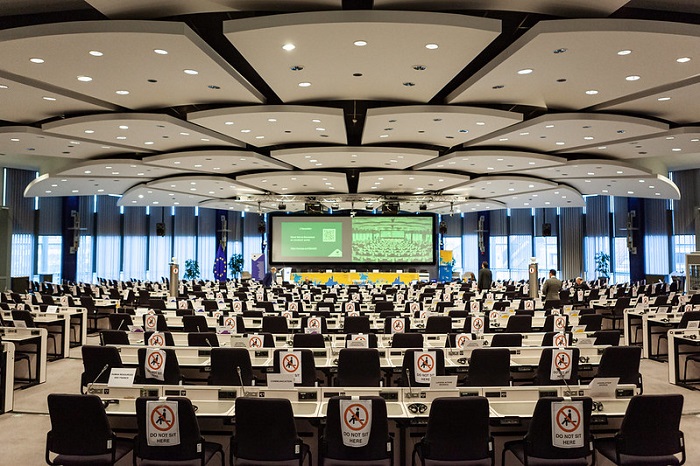#CoRplenary: Local leaders to discuss democracy, the European way of life, and the Conference on the Future of Europe

Also on #CoRplenary agenda: Resolution on cross-border cooperation, and recommendations on Green Deal dossiers, digital services, smart mobility, and regional airports.
Three vice-presidents of the European Commission will address the European Committee of the Regions on 30 June, discussing efforts to strengthen and deepen democracy, build inclusive societies, and improve EU legislation. Vice-President Věra Jourová will present the European Democracy Action Plan to empower citizens and build more resilient democracies, Vice-President Margaritis Schinas will highlight the role of education and culture in protecting the European way of life, while Vice-President Maroš Šefčovič will set out the European Commission’s work programme as well as the Commission’s efforts to embed strategic foresight into its work. Members of the CoR will also discuss the Conference on the Future of Europe with the three MEPs leading the work of the European Parliament in the EU-wide consultation.
Follow the plenary on the CoR website
30 June: Debate with Maroš Šefčovič, Vice-President of the European Commission, on better regulation, foresight and the European Commission’s work programme
Maroš Šefčovič, Vice-President of the European Commission, will update local and regional leaders on the progress of the EU’s Better Regulation Agenda, including the EU’s efforts to improve outreach to regions and other stakeholders and how the Commission is seeking to integrate strategic foresight its agenda. He will also discuss the European Commission’s Work Programme 2022; the CoR will at the plenary session adopt a resolution on the Work Programme. CoR contributions to the Better Regulation Agenda include its pioneering feedback mechanism, RegHub 2.0.
30 June: Debate with Margaritis Schinas, Vice-President of the European Commission, on promoting the European way of life
The CoR will welcome Margaritis Schinas, Vice-President of the European Commission for Promoting our European Way of Life, to its plenary for a debate on the role of education and culture in creating inclusive societies.
30 June: Debate with members of the executive board members of the Conference on the Future of Europe
MEPs Manfred Weber (DE/EPP), Guy Verhofstadt (BE/RE), and Iratxe García Pérez (ES/S&D) will join the European Committee of the Regions to discuss the recently launched Conference on the Future of Europe. The Conference will entail months consultations to identify areas of life on which citizens would like to see the EU focus its work, leading to a set of recommendations for EU decision-makers in spring 2022. The three MEPs are members of the Conference’s executive board. The CoR, which is organising citizens’ dialogues across the Union as part of its contribution to an open, inclusive, transparent and structured debate, will be represented by 18 members in the Conference’s concluding plenary.
30 June: Debate with Věra Jourová, Vice-President of the European Commission, on the European Democracy Action Plan
Věra Jourová, Vice-President of the European Commission for Values and Transparency, will on 30 June discuss the European Democracy Action Plan, which seeks to protect the integrity of electoral processes, involve and empower the public, strengthen the media, and address challenges such as disinformation. At the plenary, CoR members will adopt recommendations on the European Democracy Action Plan drafted by Alexandra Dulkiewicz (PL/EPP), mayor of Gdańsk, and recommendations on the EU’s strategy to strengthen the application of the EU Charter of Fundamental Rights, drafted by Jean-Luc Vanraes (BE/RE), member of Uccle Municipal Council.
KEY DEBATES
- Wednesday, 30 June, 3.00 p.m.: Debate on Better Regulation, Foresight and the European Commission Work Programme for 2022, with Maroš Šefčovič, Vice-President of the European Commission for Interinstitutional Relations and Foresight.
- Wednesday, 30 June, 4.00 p.m.: Debate on promoting European values through culture and education, with Margaritis Schinas, Vice-President of the European Commission for Promoting our European Way of Life.
- Wednesday, 30 June, 5.30 p.m.: Debate on the Conference on the Future of Europe, with MEPs Manfred Weber (DE/EPP), Guy Verhofstadt (BE/Renew Europe), and Iratxe García Pérez (ES/S&D).
- Wednesday, 30 June, 6.20 p.m.: Debate on the European Democracy Action Plan, with Věra Jourová, Vice-President of the European Commission for Values and Transparency.
RESOLUTIONS FOR ADOPTION
- On the European Commission Work Programme for 2022.
- On the Future of Cross-Border Cooperation.
OPINIONS FOR ADOPTION
- European Democracy Action Plan. Rapporteur: Alexandra Dulkiewicz (PL/EPP), mayor of Gdańsk.
- Communication on the new strategy to strengthen the application of the EU Charter of Fundamental Rights. Rapporteur: Jean-Luc Vanraes (BE/RE), member of Uccle Municipal Council.
- On the Digital Services Act and the Digital Markets Act. Rapporteur: Rodi Kratsa (EL/EPP), Governor of Ionian Islands Region.
- An Action Plan for the Social Economy. Rapporteur: Mikel Irujo Amezaga (ES/EA), Director-General for External Action of the Government of Navarre.
- Future plan for care workers and care services – local and regional opportunities in the context of a European challenge. Rapporteur: Heinrich Dorner (AT/PES), member of the State Government of Burgenland.
- Delivering on the Sustainable Development Goals by 2030. Rapporteur: Ricardo Rio (PT/EPP), Mayor of Braga.
- Forging a climate-resilient Europe – the new EU Strategy on Adaptation to Climate Change. Rapporteur: Markku Markkula (FI/EPP), Chair of the Espoo City Board and President of the Helsinki Region.
- Stepping up Europe’s 2030 climate ambition towards COP26. Rapporteur: Vincent Chauvet (FR/RE), Mayor of Autun.
- Resilience of critical entities. Rapporteur: Mario Guarente (IT/ECR), Mayor of Potenza.
- Revised Trans-European Energy Infrastructure Regulation fit for the Green and Digital Transition. Rapporteur: Robert Sorin Negoiță (RO/EPP), Mayor of District 3, Bucharest Municipality.
- Sustainable and Smart Mobility Strategy. Rapporteur: Robert Van Asten (NL/RE), Alderman of The Hague.
- The future of regional airports-challenges and opportunities. Rapporteur: Władysław Ortyl (PL/ECR), President of the Podkarpackie Region and president of the ECR group.
- Renewed partnership with the Southern Neighbourhood: A new Agenda for the Mediterranean. Rapporteur: Vincenzo Bianco (IT/PES), member of Catania Municipal Council.
Practical information:
- Location: Hybrid online and in-person – Jacques Delors Building (Room JDE 52), European Committee of the Regions, rue Belliard 99-101, 1040 Brussels
- Date: Wednesday, 30 June – Thursday, 1 July 2021.
- Background material: The plenary agenda and opinions, with amendments.
- Webstreaming: On the website of the CoR.
- App: The European Committee of the Regions app is downloadable via the Apple App Store and the Google Play Store.
Contact:


